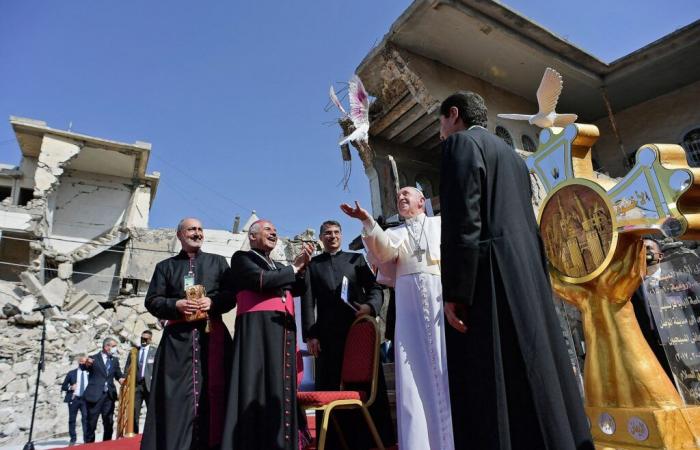In “Espere”, his autobiography published by Albin Michel, Pope Francis recounts the neighborhood of his childhood, a multi-ethnic and multi-religious microcosm. And in particular draws up a moving and human account of these prostitutes of the barrio with whom he had a… biblical relationship.
« The barrio was a complex, multi-ethnic, multi-religious and multi-cultural microcosm.
My family has always had excellent relations with the Jews, whom in Flores we called “the Russians” because many came from the Odessa region, where there lived a very large Jewish community, which was subsequently decimated in a terrible massacre by Romanian and Nazi occupying forces. Many of the customers at the factory where my father worked were Jewish, and many were our friends.
The rest after this ad
Likewise, in our group of kids, we had several Muslim friends, who for us were “the Turks” because most of them had arrived with a passport from the former Ottoman Empire. They were Syrian, lIbanian, Iraqi or Palestinian. The first Arabic-language newspaper in Buenos Aires dates from the beginning of the xxand century. […] Is the Turk there? The Russian is coming too? In the neighborhood of my green years, differences were normal, and we respected each other.
[…]
Like its market, the neighborhood was a concentration of varied humanity. Laborious, suffering, devout, good-natured.
There were four “old maids”, the Alonso ladies, pious women from Spain who had emigrated to the Plata, very skilled embroiderers with refined technique. A point, a prayer, a point, a prayer. My mother sent my sister to them to learn; but Marta was bored to death, she protested: “Mom, they never talk, they don’t say a word, they pray and that’s it! »
[…]
On the corner of our street was a hair salon with an adjoining apartment. The hairdresser’s name was Margot, and she had a sister who was a prostitute. She combined this activity with shampoos, cuts and styling. They were very good people, my mother sometimes went to have her hair cut at their house. One day, Margot had a son. I didn’t know who the father was, that surprised me and made me curious, but the neighborhood didn’t seem to care too much.
At the same number, in another apartment, a man was married to a woman who had been a revue dancer, and also had a reputation for being a prostitute. She died young, of tuberculosis, tested by this life. I remember the hasty sadness of her funeral: her husband seemed touchy and distant, withdrawn into his selfishness, only concerned that the illness would not reach him and of the new woman who would replace the deceased. This woman’s mother, Berta, a Frenchwoman, had also been a dancer, rumored to have performed in Parisian nightclubs. Now she worked as a servant, for hours and hours, but her demeanor and dignity were impressive.
So, from my childhood, I also knew the darker and more painful side of existence, both of us together, on the same block. The world of prison too: the brushes we used for clothes were made by the inmates of the local prison, which is how I first discovered this reality.
-Two other girls from the barrio, also sisters, were prostitutes, but high-end. They made appointments by phone, we came to pick them up by car. They were called La Ciche and La Porota, the whole neighborhood knew them. The years passed, and one day, when I was auxiliary bishop of Buenos Aires, my telephone rang: it was Porota who wanted to speak to me. I had completely lost sight of her since I was a kid. “Hey, remember me? I heard that you had been made a bishop, I want to see you! » A real river in flood. I received her at the bishopric. I was still in Flores, it must have been 1993. “You know, I have been a prostitute everywhere, even in the United States,” she told me. I made money, and then I fell in love with an older man, he was my lover. When he died, I changed my life. I have a pension now. I’m going to bathe the little old men and women who have no one to take care of them in the rest homes. I don’t go to mass much. I’ve done everything with my body, but now I want to take care of bodies that no one cares about. » A contemporary Madeleine. She told me that her sister, La Ciche, had also changed her life, and that she spent her time praying in church. “It’s become a candle sucker!” You too, tell him to get off his butt and do something for others! » She had a picturesque and very colorful language, four swear words every five words. And she was sick.
Some time later, when I was already cardinal of Buenos Aires, La Porota called me back to tell me that she wanted to organize a party with her friends, and to ask me if I could say mass for them, in the San Ignazio parish. I answered yes, of course, while wondering who these friends could be. “Come early, there are many who want to confess,” added the Porota.
[…]
At that time, I often saw Father Pepe, don José María di Paola, a young priest whom I had known since the beginning of my episcopate, and who since 1997 had been parish priest at the Virgen de Caacupé, in Villa 31. It was a man of God, one of the priests who always helped in the villas miseriesthe slums that dot Buenos Aires – around thirty in the capital alone, a thousand throughout the province. The villas are a concentrate of humanity, anthills where hundreds of thousands of people live. Families mostly from Paraguay, Bolivia, Peru and other parts of the country. The State has always been absent, and when for forty years there has been no housing, no electricity, no gas, no transport, it is not surprising that a parallel organization is being set up.
[…]
More than once, after work, he would drive two hours to the cathedral. I waited for him, I opened the door for him, I listened to him, we talked. Always in freedom. One meeting after another, one month after another, time passed, until one evening he said to me: “Father, here I am… I would like to celebrate mass. » We hugged each other. “Do you want us to celebrate together on July 20, the Fiesta del Amigo day? » He was delighted. “Then let’s do this in San Ignazio,” I said. I’m going to say mass there because a lady from Flores asked me to. »
So, we went there together. We left on foot from the archbishopric along Calle Bolívar, and we arrived at the church: they were all former prostitutes and members of the “union”. Everyone wanted to confess. It was a magnificent celebration. La Porota was also happy, almost moved.
She called me one last time some time later, while she was hospitalized. “I asked you to come so that you could give me the anointing of the sick and communion, because this time I’m not going to make it, you know. » All between an imprecation against a doctor and a cry towards another patient; even exhausted, she had not lost her vigor. Genius and figure until the grave“genius and elegance to the grave”, as they say in Argentina.
She left in peace, like “the publicans and the prostitutes” who “will go before us into the kingdom of Heaven” (Matthew 21, 31). I liked her very much. Even today, on the anniversary of her death, I do not forget to pray for her.
Excerpts from HopePope Francis (with Carlo Musso)
Translated from Italian by Françoise Bouillot and Samuel Sfez (Editions Albin Michel, 604 pages, 28 euros






